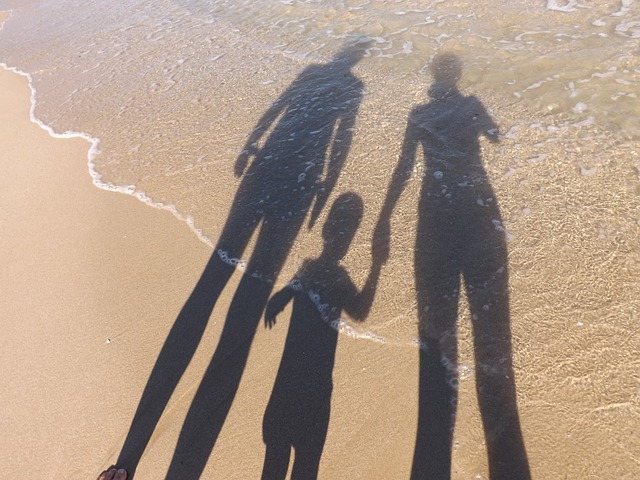Of growing up at home, I remember:
- Playing dolls in the living room while my mother worked (the shop was basically the front porch at that time). I set my doll on top of the kerosene heater and it went up in flames. She put out the fire. The doll went into the trash.
- Hours spent playing outside, just my sister and I. We climbed the huge farm gas tanks behind the barn. The little one was there first, a silver tank. We pretended it was a horse and named it Silver. Then this HUGE one arrived (I believe for diesel). It was also silver, but that name was taken, so the the mammoth “horse” was named Goldie. These two horses lived just yonder of Kitty Peak, a small pile of dirt where one of our barn cats birthed her kittens.
- Convincing our friend Katie that Gummie Bears lived in our front tree.
- Spending entire weekends on the couch, reading.
Of family vacations, I remember:
- The long drives and finishing my homework for a week in the car on the way down.
- The time my mom forgot her purse under the bench at the bus stop in Pigeon Forge and my dad sprinted back to the hotel to find it.
- Spending lunchtime each day in Puerta Vallarta watching the time share salesman attempt another deal. We said it was better than our usual The Young & The Restless lunchtime show.
- Every time we left the country, someone thought my sister and I were twins. Even despite the hair color, height, eye color and general face dissimilarities…. twins?
- Learning to ski in Cumberland. Don said I couldn’t get back in the boat until I got up on skis. I got up the next time. (I subsequently got bored of the boat pulling me around and spent the follow up trips to Cumberland curled up in the front of the boat with a book. That’s my idea of vacation.)
Of time with my grandparents, I remember:
- Grandma letting us pick out 3 kinds of cereal for our 3 day stay.
- Riding to the lake and fighting about who got to ride “on the hump” while we listened to the Oldsmobile song on repeat. (Which was in a tape player, so it was the old rewind, stop, listen, rewind some more, stop, listen, rewind, stop, To Far!, Fast Forward, Oh Just Stop Here, method.)
- When Rebecca put on some of grandma’s make-up and it was burning her face and we had to go to the neighbor, Jenny’s house to find grandma so she could tell us to wash it off with Pond’s.
- Playing Hide the Thimble.
- Grandma Cella’s homemade waffles. (I’m noticing a trend around the breakfast food theme of my memories here…)
- Going camping and playing on the playground. I fell through the huge hole in the middle where you climb up and down and it knocked the wind out of me. I cried. A lot. I think this is why I hate camping.
These are a sampling of my memories, what comes to mind first. There are more, of course, but I don’t want to bore you with the non-poignant parts of my 35 years on this earth. For some reason, (we can probably blame Inside Out, though this has been brewing for some time) I’ve been pondering the ways in which memories are made. It’s probably because the past month has been spent doing one of two things: moving or vacationing.
I appreciate our culture’s sentiment at wanting to value the time with people we love over material things. A quick scan of Pinterest will give you all the wall hangings (our generation’s version of the cross-stitched pillow) with sayings about making memories, not money. I say to this, Cheers! I’m in wholehearted agreement.
Yet something about the approach is amiss. These memories we wish to make seem a bit contrived. Forced. Our culture’s general approach at Making Memories Not Money is to spend money as an attempt to buy a few memories. We go on this trip. We try that excursion. We bring home the t-shirt, the stuffed doll and the photo of us making the 9000 foot drop. And we ask the children their favorite part and it’s doing the monkey bars in the play area that looks exactly like our smallest city park.
Ask my small group, I’m all about “creating space” for the magic to happen. Slowing down, providing opportunity, the pause in the middle. If we don’t prioritize time with family and friends, these memories will probably never exist.
Creating space and buying the all-inclusive package,* however, are two different things. The problem with going into an event with the hope of Making Memories is that you’re ultimately buying a product. You fork out the $72.95 and spend the time, and now you want the memories. Remember when? And how we?
Memories aren’t made with purchases. They aren’t even created in the Big Events. They’re not created in the rushing through of the outing, making sure to have “family day” and “date night” and hashtagging the Instagrams appropriately.**
Actual memories are formed when we’re fully present to the moment, not by the moment encompassing all attributes of perfection. The lighting doesn’t have to be right. We rarely catch it on camera. And if we ask our kids, chances are the memories will rarely involve what we think.
The only thing I remember about Disney World was my complete disappointment with Cinderella’s castle (a hallway? seriously?!) and the fact that my sister did not want to ride Space Mountain and it was a long line, so we didn’t. That’s what I took away from the Most Magical Place on Earth.
But the rest of the trip to Florida? I remember riding my grandparents’ 3-wheeled bicycles around and around the park they lived. I remember shuffle board. I remember sitting on their make-shift porch with strings of bright lights around the canopy. I remember watching Hee-Haw and Green Acres with complete confusion.
I’m not sure how do this memory-making thing right. I know my kids will make their own memories of our time, no matter what we provide. I simply hope that I don’t live under the guise that because we went to All of the Places and Did All of the Things and Bought All of the T-shirts (<- that will never happen, I’m too cheap), that their memories will be Big and Amazing and Wow.
Perhaps that’s the goal? Remembering what memories are and what they do. It’s not a competition. At the end of our life, we won’t be sitting around comparing vacation stories and passport stamps. We won’t recall itineraries of our vacations, the things planned and lived. We’ll remember the people we spent them with and how they made us feel.
*I just went on an all-inclusive vacation. It was delightful. This is not a statement of all expensive things are bad.
**I have done all of these things. Don’t read it as a statement of blame. They are not bad things.

